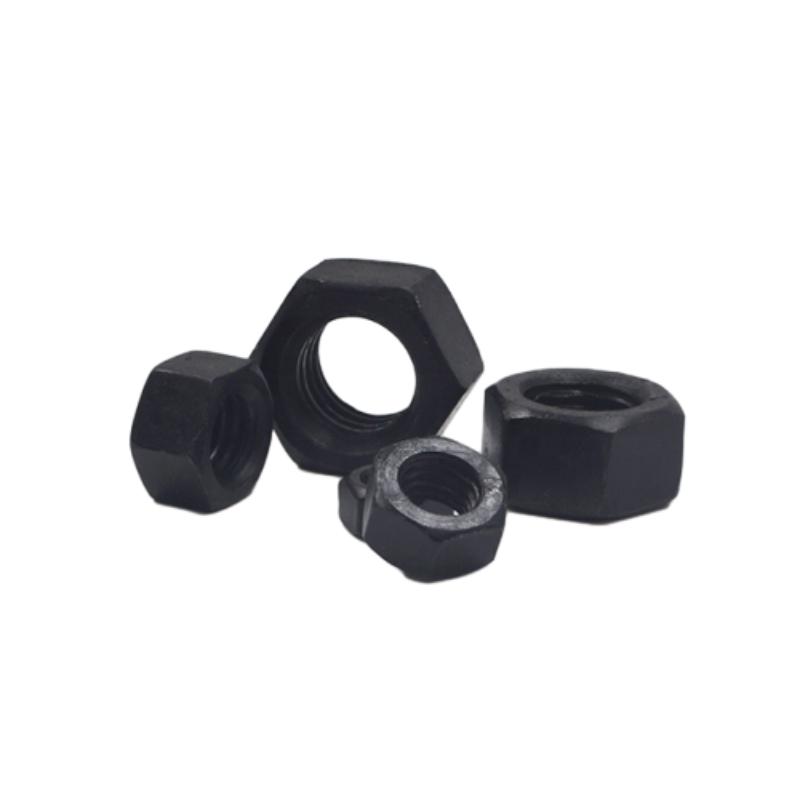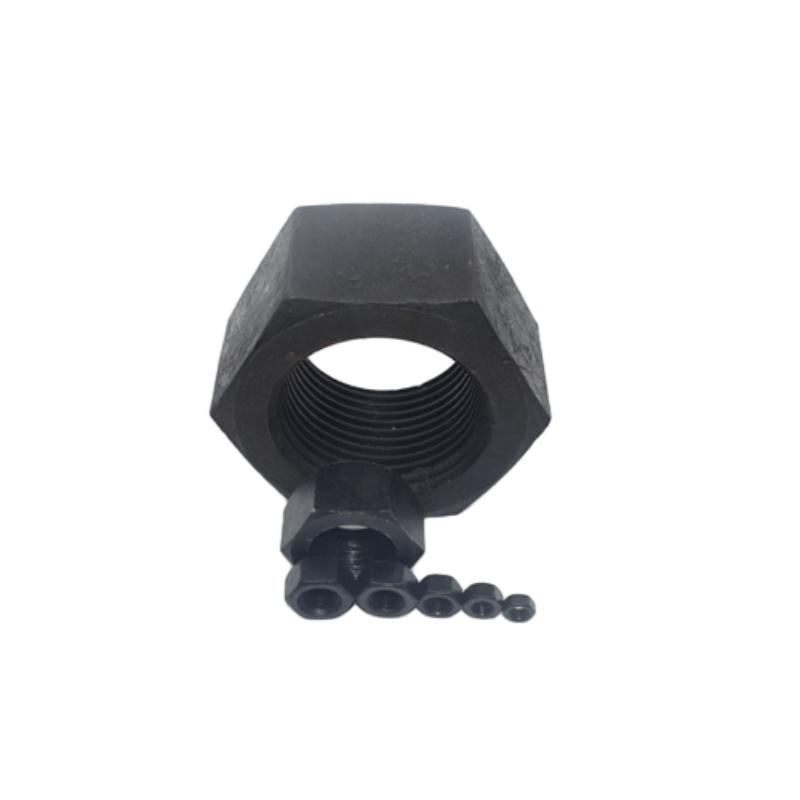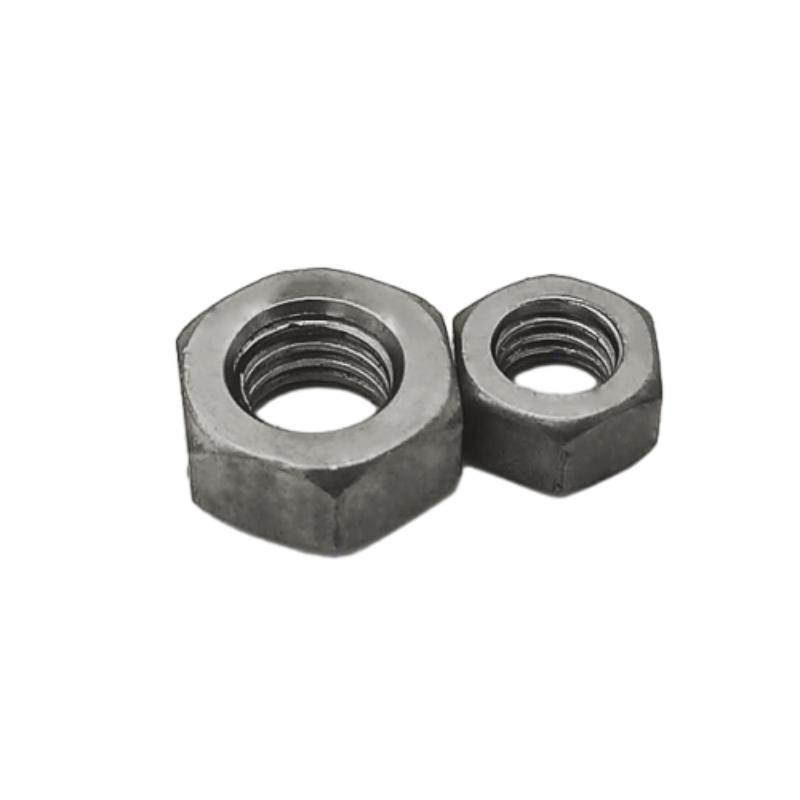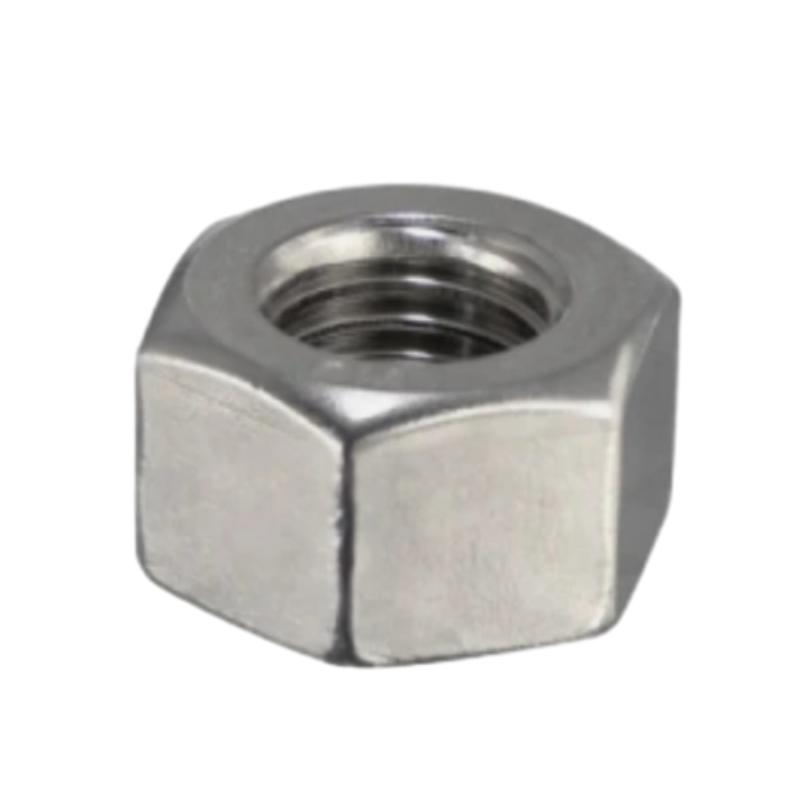Ago . 15, 2025 02:00 Back to list
Hex Nuts: All Sizes & Types for Secure Fastening
The Indispensable Role of Hex Nuts in Industrial Fastening
In the realm of mechanical engineering and construction, the hex nut stands as a foundational component for securing connections. Its hexagonal shape allows for easy gripping with wrenches, ensuring robust and reliable fastening. As a leading manufacturer, we specialize in high-quality DIN934 Carbon Steel Grade 4.8/8.8/10.9 Zinc/Plain/HDG M8-M20 Hex Nuts, engineered to meet the stringent demands of diverse industrial applications. These fasteners are crucial across various sectors, from heavy machinery to intricate structural assemblies, providing the stability and integrity necessary for operational safety and longevity. Our commitment extends to delivering products that not only meet but exceed international standards, embodying both durability and precision.
The market for industrial fasteners, particularly for components like the hex nut, is witnessing significant trends driven by the increasing complexity of infrastructure projects and the demand for enhanced safety and performance. Innovations in material science and surface treatments are continuously improving the lifespan and resistance of these critical components against environmental stressors. Understanding the precise specifications, such as hex nut sizes, hex nut dimension, and material grades, is paramount for engineers and procurement specialists to ensure optimal performance in their specific applications, preventing failures and reducing maintenance costs over the operational life cycle of equipment and structures.
Precision Manufacturing: The Journey of a Hex Nut
The manufacturing of a high-quality hex nut, especially our DIN934 Carbon Steel series, involves a meticulously controlled process designed to achieve superior strength and dimensional accuracy. The primary manufacturing method for standard nuts is cold forging or cold forming, which starts with high-grade carbon steel wire or bar stock. This material is fed into multi-station progressive cold headers. In these machines, precise dies and punches progressively form the material into the desired hexagonal shape, including the internal hole, without the application of heat that would alter its molecular structure prematurely. This cold working process enhances the material's strength and fatigue resistance, creating a denser grain structure.
Following the initial forming, the internal threads are precisely cut or rolled. Thread rolling, a preferred method, deforms the material to create threads rather than cutting it, which preserves the material's strength and provides a smoother, more durable thread. For higher strength grades like 8.8 and 10.9, heat treatment — quenching and tempering — is a critical step. This process involves heating the nuts to specific temperatures and then rapidly cooling them, followed by tempering to achieve the desired hardness and toughness, ensuring they can withstand high stress. Surface treatments like zinc plating, plain (self-color), or Hot-Dip Galvanizing (HDG) are then applied to enhance corrosion resistance and aesthetics, tailored to the end application’s environmental demands.

Quality control is integrated throughout the entire manufacturing flow. Each batch of hexagon nuts undergoes rigorous inspection, adhering to international standards such as ISO (International Organization for Standardization) and ANSI (American National Standards Institute). These inspections cover dimensional accuracy, thread quality, material composition, mechanical properties (tensile strength, proof load), and coating thickness. This meticulous approach ensures that every DIN934 Carbon Steel hex nut delivers consistent performance, extended service life, and meets critical industrial specifications, contributing to reduced operational risks and enhanced system reliability across various sectors.
Technical Specifications and Dimensions for DIN934 Hex Nuts
Understanding the precise technical parameters and dimensions is fundamental for selecting the correct hex nut for any given application. Our DIN934 Carbon Steel nuts are available in a comprehensive range of metric nut sizes, from M8 to M20, catering to a wide spectrum of fastening requirements. The "M" designation refers to the metric thread diameter, directly correlating to the bolt it is designed to pair with. For instance, an M12 nut size is designed for an M12 bolt, while an M20 nut size is for an M20 bolt, ensuring a perfect fit and optimal load distribution for secure connections.

Beyond the nominal size, other critical dimensions include the wrench size (the width across flats, 's') and the nut height ('m'). These dimensions are standardized under DIN934, ensuring interchangeability and compatibility worldwide. For example, for an M12 hex nut, the typical width across flats (s) is 19mm, and the height (m) is approximately 9.6mm. Similarly, for an M20 hex nut, 's' is 30mm and 'm' is 16mm. These precise measurements are crucial for engineers designing assemblies and for maintenance teams performing installations or replacements.
Below is a typical specification table for common DIN934 hex nut sizes and their corresponding dimensions, illustrating the consistency and precision of our product range. For specific non-metric requirements, such as a 1 1/8 nut dimensions, cross-referencing with relevant imperial standards (e.g., ANSI B18.2.2) is necessary, although our primary focus is on the widely adopted metric DIN934 standard.
DIN934 Hex Nut Standard Dimensions (Metric)
| Nominal Thread (d) | Pitch (P) | Width Across Flats (s) | Nut Height (m) | Approx. Weight (kg/1000 pcs) |
|---|---|---|---|---|
| M8 | 1.25 | 13 | 6.4 | 3.8 |
| M10 | 1.5 | 17 | 8.0 | 9.8 |
| M12 | 1.75 | 19 | 9.6 | 17.5 |
| M16 | 2.0 | 24 | 12.8 | 39.0 |
| M20 | 2.5 | 30 | 16.0 | 83.0 |
Material Grades and Coatings for Enhanced Performance
Our DIN934 hex nut range is available in various carbon steel grades: 4.8, 8.8, and 10.9. These grades signify the mechanical properties, specifically the tensile strength and yield strength, defining the nut's capacity to withstand applied loads. Grade 4.8 offers good strength for general-purpose applications, while Grade 8.8 provides high tensile strength, ideal for structural applications. Grade 10.9 represents very high strength, suitable for heavy-duty applications requiring maximum load-bearing capabilities. Selecting the appropriate grade is critical to ensuring the integrity and safety of any bolted joint system.
Beyond material strength, the surface coating plays a pivotal role in dictating the hex nut's lifespan and performance in corrosive environments. We offer three primary finishes: Zinc Plated, Plain (Self-Colour), and Hot-Dip Galvanized (HDG). Zinc plating provides a basic level of corrosion resistance, suitable for indoor or mild outdoor exposure, and gives a bright, aesthetically pleasing finish. Plain finished nuts, while offering no inherent corrosion resistance, are often used in controlled environments or where a specific post-assembly coating is applied.

Hot-Dip Galvanizing (HDG) involves immersing the hex nut in molten zinc, creating a metallurgically bonded coating that offers superior long-term corrosion protection, especially in harsh outdoor or marine environments. This robust coating significantly extends the fastener's lifespan, reducing the need for premature replacement and maintenance. The choice of coating directly impacts the fastener's resistance to rust and degradation, making it a critical consideration for industries where components are exposed to moisture, chemicals, or extreme temperatures, directly impacting overall operational efficiency and safety.
Versatile Applications and Evolving Industry Trends
The versatility of the hex nut means it finds applications across an incredibly broad range of industries. In the petrochemical sector, these nuts are vital for securing pipelines, structural components of refineries, and storage tanks, where resistance to corrosion and high pressure is non-negotiable. The metallurgy industry relies on robust fasteners for heavy machinery, furnaces, and conveyors, demanding materials that can withstand extreme temperatures and constant stress. For water supply and drainage systems, corrosion-resistant HDG hexagon nuts are crucial for pipe connections, pumps, and valves, ensuring leak-free and durable infrastructure.
Beyond these, hex nuts are extensively used in construction, automotive, railway, agricultural machinery, and power generation sectors, underscoring their universal importance. For specialized applications, variants like the nylock hex nut (or hex nylock nut) are employed where vibration loosening is a concern. These nuts feature a nylon insert that creates friction with the bolt threads, providing enhanced locking capability and preventing unintentional loosening, crucial for dynamic or high-vibration assemblies.

Current industry trends indicate a growing demand for fasteners that offer improved energy efficiency, enhanced safety features, and extended lifespan. This translates into a preference for higher strength grades (like 8.8 and 10.9) and advanced corrosion-resistant coatings. Furthermore, the push towards modular construction and pre-fabricated assemblies means a greater emphasis on consistent quality and precise dimensions for every hex nut. Our products are designed to meet these evolving demands, providing reliable, long-lasting solutions that contribute to the overall efficiency and safety of industrial operations.
Customization Solutions and Product Comparison
While standard DIN934 hex nut sizes and grades cover a vast array of applications, specific projects often require customized solutions. We offer bespoke manufacturing capabilities for hex nuts, allowing for modifications in dimensions, thread types (e.g., fine pitch), material grades, and specialized coatings to meet unique engineering challenges. This flexibility ensures that even the most niche requirements, from unusual hex nut dimension needs to specific environmental resistances, can be adequately addressed, providing a perfect fit for specialized equipment and infrastructure.
To aid in decision-making, it's beneficial to compare our DIN934 Carbon Steel hex nut with other common fastener types or materials. This comparison highlights the specific advantages of our product range in terms of cost-effectiveness, strength, and suitability for various environments.
Product Comparison: DIN934 Carbon Steel Hex Nut vs. Alternatives
| Feature | DIN934 Carbon Steel (Gr 4.8/8.8/10.9) | Stainless Steel (A2/A4) | Brass Nuts |
|---|---|---|---|
| Strength | High (up to 10.9) | Moderate (A2-70, A4-80) | Low |
| Corrosion Resistance | Good (Zinc/HDG) to Excellent (HDG) | Excellent (inherent) | Good (non-magnetic) |
| Cost-Effectiveness | Very High | Moderate to High | Moderate |
| Typical Applications | Structural, Heavy Machinery, General Industry | Marine, Food, Medical, Chemical | Electrical, Decorative, Plumbing |
| Magnetic Properties | Magnetic | Non-magnetic (most types) | Non-magnetic |
Ensuring Trust: Quality Assurance, Delivery, and Support
At the core of our operations is an unwavering commitment to quality. Our DIN934 Carbon Steel hex nuts are manufactured under strict adherence to international quality management systems, including ISO 9001:2015 certification. This ensures that every stage, from raw material sourcing to final packaging, meets the highest standards of precision and reliability. We conduct extensive in-house testing, including tensile strength tests, proof load tests, hardness tests, and coating thickness measurements, to guarantee that our products consistently exceed the stipulated mechanical and performance criteria.
We understand the critical importance of timely delivery in industrial projects. Our streamlined logistics and robust supply chain management ensure efficient processing and dispatch of orders, with clear communication on delivery schedules. Standard orders for common hex nut sizes can often be fulfilled within competitive lead times, while customized solutions are managed with detailed project timelines. Our quality assurance extends to a comprehensive product warranty, covering manufacturing defects and material integrity, providing our clients with complete peace of mind and demonstrating our confidence in the durability of our hexagon nuts.
Beyond the product, our dedicated customer support team is available to assist with technical queries, product selection, and order tracking. We offer expert advice on the best hex nut solutions for specific applications, drawing on years of industry experience to provide tailored recommendations. Our goal is to build long-term partnerships based on trust, reliability, and mutual success, ensuring that our clients receive not just a product, but a complete fastening solution backed by comprehensive support and a commitment to excellence.
Frequently Asked Questions (FAQ) about Hex Nuts
-
Q1: What is the difference between Grade 4.8, 8.8, and 10.9 hex nuts?
These grades indicate the mechanical strength of the carbon steel hex nut. Grade 4.8 is a lower strength, general-purpose nut. Grade 8.8 is a high-strength fastener, commonly used in structural applications. Grade 10.9 is an even higher strength nut, designed for heavy-duty applications requiring maximum tensile and yield strength. The higher the number, the stronger the nut.
-
Q2: When should I choose a Hot-Dip Galvanized (HDG) hex nut?
HDG hex nuts are recommended for outdoor applications or environments with high humidity, chemical exposure, or marine conditions. The thick zinc coating provides superior corrosion resistance compared to plain or zinc-plated nuts, significantly extending the lifespan of the fastened joint in harsh conditions.
-
Q3: Can I get customized hex nut sizes or dimensions?
Yes, we offer customization services for hex nut dimensions, materials, and coatings to meet specific project requirements. Please provide your detailed specifications, and our technical team will work with you to provide a tailored solution that fits your precise needs, including non-standard hex nut sizes or unique thread configurations.
-
Q4: Are your hex nuts compliant with international standards?
Absolutely. All our DIN934 hexagon nuts are manufactured and tested in strict accordance with relevant international standards, including ISO and ANSI, ensuring consistent quality, dimensional accuracy, and mechanical performance for global compatibility.
References
- International Organization for Standardization. ISO 898-2: Mechanical properties of fasteners made of carbon steel and alloy steel — Part 2: Nuts with specified proof load values — Coarse thread and fine pitch thread.
- American National Standards Institute. ANSI/ASME B18.2.2: Nuts for General Applications: Machine Screw Nuts, Hex, Square, Hex Flange, and Wing Nuts.
- ASM International. Handbook of Mechanical Properties of Fasteners.
- ASTM International. ASTM A563/A563M: Standard Specification for Carbon and Alloy Steel Nuts.


